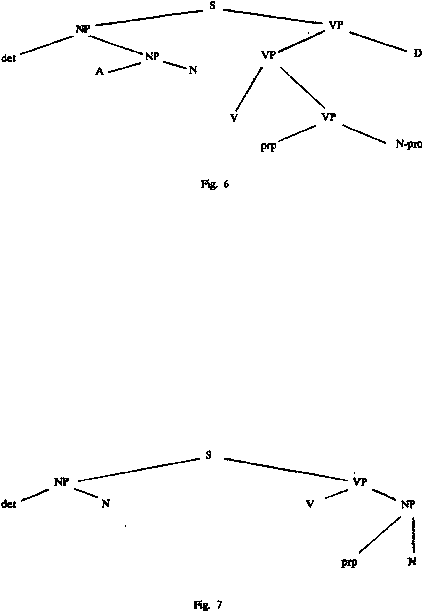
128
§ 3. When analysing sentences in terms of syntagmatic connections of their parts, two types of subordinative
relations are exposed: on the one hand, obligatory relations, i.e. such as are indispensable for the existence of
the syntactic unit as such; on the other hand, optional relations, i.e. such as may or may not be actually repre-
sented in the syntactic unit. These relations, as we have pointed out elsewhere, are at present interpreted in
terms of syntactic valency (combining power of the word) and are of especial importance for the characteristic
of the verb as the central predicative organizer of the notional stock of sentence constituents. Comparing the IC-
representation of the sentence with the pattern of obligatory syntactic positions directly determined by the
valency of the verb-predicate, it
is
easy to see that this pattern reveals the essential generalized model of the
sentence, its scmantico-syntactic backbone. For instance, in the cited sentence this pattern will be expressed by
the string "The lady listened to me", the attribute small and the adverbial attentively being the optional parts of
the sentence. The IC-model of this key-string of the sentence is logically transparent and easily grasped by the
mind (sec Fig. 7).
Thus, the idea of verbal valency, answering the principle of dividing all the notional sentence parts into
obligatory and optional, proves helpful in gaining a further insight into the structure of the simple sentence;
moreover, it is of crucial importance for the modern definition of the simple sentence.
In terms of valencies and obligatory positions first of all the category of "elementary sentence" is to be
recognized; this is a sentence all the positions of which are obligatory. In other words, this is a sentence which,
besides the principal parts, includes only com-plementive modifiers; as for supplcmcntive modifiers, they find
eo place in this type of predicative construction.
After that the types of expansion should be determined which do not violate the syntactic status of the
simple sentence, i.e. do not change the simple sentence into a composite one. Taking into consideration the
strict monopredicative character of the simple sentence as its basic identification predicative feature, we infer
that such expansions should not complicate the predicative line of the sentence by any additional predicative
positions.
Finally, bearing in mind that the general identification of obligatory syntactic positions affects not only the
principal parts of the sentence but is extended to the complementive secondary parts, we define the unexpanded
simple sentence as a monopredicative sentence formed only by obligatory notional parts. The expanded simple
sentence will, accordingly, be defined as a monopredicative sentence which includes, besides the obligatory
parts, also some optional parts, i.e. some supplementive modifiers which do not constitute a predicative
enlargement of the sentence.
Proceeding from the given description of the elementary sentence, it must be stressed that the pattern of this
construction presents a workable means of semantico-syntactic analysis of sentences in general. Since all the
parts of the elementary sentence are obligatory, each real sentence of speech should be conside I as categorially
reducible to one or more elementary sentences, which expose in an explicit form its logical scheme of

